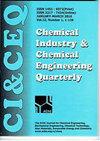Effects of adding different quantities of yeast and chokeberry juice on fermentation of mead
IF 0.8
4区 工程技术
Q4 CHEMISTRY, APPLIED
Chemical Industry & Chemical Engineering Quarterly
Pub Date : 2022-01-01
DOI:10.2298/ciceq220325022m
引用次数: 0
Abstract
Honey is a product of high nutritive value, used as a raw material for obtaining mead. The quality of mead can be improved by adding fruit juices, including chokeberry juice. This paper aims to assess the effects that adding different quantities of chokeberry juice, with the variation of 3 amounts of inoculated yeast, has on the fermentation course, physicochemical, antioxidant and antimicrobial properties of mead. The parameters analyzed are the dry matter content, pH value, and content of volatile acids, ethanol and methanol, total phenols and flavonoids, FRAP, DPPH and ABTS tests and antimicrobial properties. The results obtained in this paper show that adding chokeberry juice improves antioxidant properties of the final product and affects positively the course of mead fermentation, i.e. it has led to an increase of the maximum concentration of ethanol (Pm). In terms of the chemical composition of mead, there is no significant difference, except in the obtained ethanol content, which is the highest in samples with 10% of added chokeberry juice. Control sample showed the best antimicrobial activity, while sample with 5 % of added chokeberry juice showed the weakest effect. The strongest effect was seen in the sample with 20% of added chokeberry juice.添加不同量酵母和蔓越莓汁对蜂蜜酒发酵的影响
蜂蜜是一种具有高营养价值的产品,常被用作酿造蜂蜜酒的原料。蜂蜜酒的质量可以通过添加果汁来改善,包括樱桃汁。本文旨在评价添加不同量的蔓越莓汁对蜂蜜酒发酵过程、理化特性、抗氧化性能和抗菌性能的影响,并对3种不同量的酵母进行接种。分析的参数包括干物质含量、pH值、挥发性酸含量、乙醇和甲醇含量、总酚和总黄酮含量、FRAP、DPPH和ABTS测试以及抗菌性能。结果表明,添加蔓越莓汁提高了最终产品的抗氧化性能,并对蜂蜜酒的发酵过程产生了积极的影响,即导致最大乙醇浓度(Pm)的增加。在蜂蜜酒的化学成分方面,除了得到的乙醇含量外,没有显著差异,在添加10%的蔓越莓汁的样品中,乙醇含量最高。对照样品的抑菌效果最好,添加5%的蔓越莓汁的抑菌效果最差。在添加20%的蔓越莓汁的样品中,效果最强。
本文章由计算机程序翻译,如有差异,请以英文原文为准。
求助全文
约1分钟内获得全文
求助全文
来源期刊

Chemical Industry & Chemical Engineering Quarterly
CHEMISTRY, APPLIED-ENGINEERING, CHEMICAL
CiteScore
2.10
自引率
0.00%
发文量
24
审稿时长
3.3 months
期刊介绍:
The Journal invites contributions to the following two main areas:
• Applied Chemistry dealing with the application of basic chemical sciences to industry
• Chemical Engineering dealing with the chemical and biochemical conversion of raw materials into different products as well as the design and operation of plants and equipment.
The Journal welcomes contributions focused on:
Chemical and Biochemical Engineering [...]
Process Systems Engineering[...]
Environmental Chemical and Process Engineering[...]
Materials Synthesis and Processing[...]
Food and Bioproducts Processing[...]
Process Technology[...]
 求助内容:
求助内容: 应助结果提醒方式:
应助结果提醒方式:


